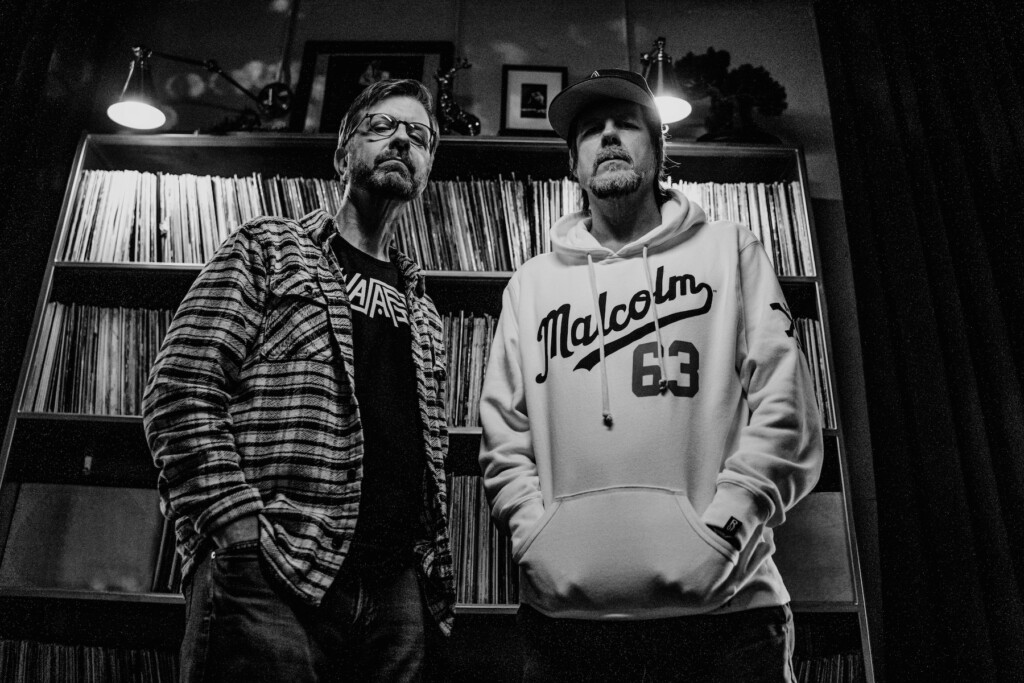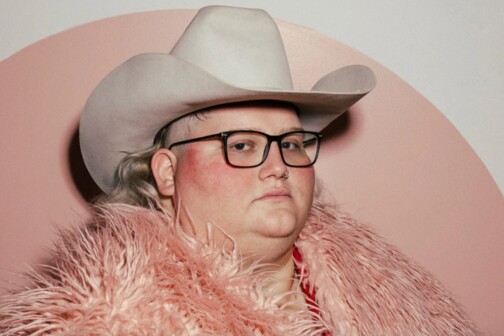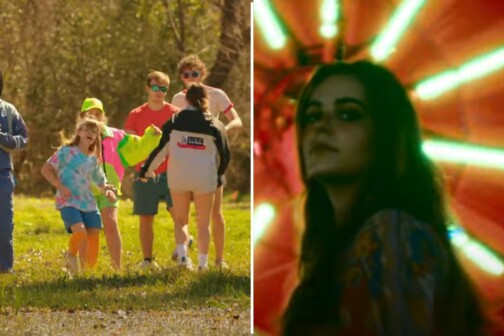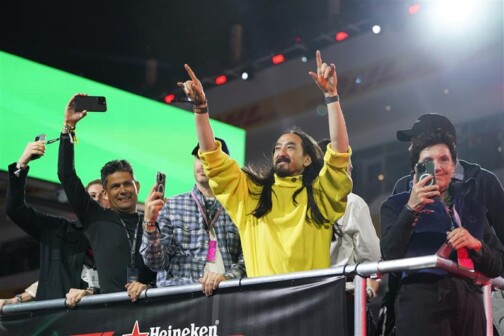Jeff “Skin” Wade has been doing so many different things for so long—Dallas Mavericks broadcaster, radio show host, brewery owner—that I sometimes forget that when I first met him, more than two decades ago, it was to talk about his music career. Back then, I was the music editor at the Dallas Observer and he was one half (with Ruben Ayala) of Hydroponic Sound System, a crate-digging hip-hop production team/musical collective. But Skin had been involved in the Dallas music scene long before that and has continued to be.
I knew that Skin had formed the Eastwood Music Group a few years ago with Josey Records’ Luke Sardello, primarily to release music by the soul group Bastards of Soul. I thought that meant he had mostly moved to the label side of things. I didn’t realize until I saw an unfinished cut of director Paul Levatino’s eponymous documentary about Bastards of Soul and its tragic end that Skin was still very much involved in the music making, too. (The film will hit theaters in a couple of months.)
There is more tangible proof with Silver Skylarks, a collaboration between Skin and Bastards’ bassist Danny Balis. What started out as a collection of demos Balis recorded during the pandemic has been fleshed out into The Number One Set and Sound, a full-length featuring the kind of funk-inflected, Afrobeat-indebted, live hip-hop soul that should appeal to fans of Khruangbin and Black Pumas (whose Adrian Quesada guests on the record). Along with vocals by Austin’ US! (Uncle Roy and Spice), the disc has contributions from a trio of rap legends: Large Professor, Kool G Rap, and Dallas’ own The D.O.C.
The Skylarks project gave Skin and Sardello a chance to pivot after the unexpected end of Bastards and even lent itself to a new name: Skylark Soul Co. This weekend will serve as a coming-out party for all of it, with Large Professor appearing at a release party for Silver Skylarks’ debut single (“Power Moves”) at the Kessler on Friday night (along with Shabazz 3 and BranooFunck) and then spinning with Quesada at LadyLove Lounge on Saturday.
Last week, I caught up with Skin to talk about all of this. (This interview has been edited for length and clarity.)
OK, so why did you guys decide to rebrand the label?
Yeah, so there was a couple of different reasons and a lot of it had to do with the way in which we started and everything that happened around that time period. The pandemic and then what happened with Bastards of Soul and then, ultimately, what happened with Chadwick. In the middle of all that, we had started the Truth to Power project and there was also, at the same time, there was a company over in the UK that did something different than us, but they were the Eastwood Music something or other. And I’m looking at all of this and I’m like, “All right, man, we’re going to…” We have our company, Eastwood Music Group, and it handles publishing and stuff, but I was like, “We want to start fresh, we want to do something different with what we’re releasing and why we’re releasing it,” and me and Danny had been working on Silver Skylarks, which is the name that Danny came up with, and Luke suggested, “What if we call this thing Skylark Soul Company and use the release as a way for us to relaunch and rebrand everything?”
And I liked that idea. I felt like it spoke more to what we wanted to do musically than something called Eastwood Music Group, so we felt like it had a better tie-in to the kind of music we were doing, spoke more to what we were doing, and then, at the same time, gave us a chance to start fresh, even though it’s all the same material and stuff and ideas that we were originally launching with.
Right. I didn’t realize, until I saw the documentary, how hands-on you were in the recording of the Bastards stuff.
Honestly, me and Luke started the record label to put out Bastards of Soul, and me and Luke have been friends for a million years and everything that he and I do and we’re going to do is rooted in this lifelong love affair with discovering music, creating music, adding to the culture. With what Luke does, if you’re going to have a giant record store and it’s an independent record store and open up locations in other cities, he left a good career to go do this and make it his life, and that’s because—I’m telling you, man, in 1990, I’m with Luke underneath bins at Half Price looking for old records and covering records, and I’m doing it for different reasons, but it shapes your life, and both of our lives are shaped by music. We were both really into Bastards of Soul and our original idea, I approached Danny and was like, “Hey, man. Let me and Luke release a 7-inch, a 45 of Bastards of Soul.”
They were doing a live cover version of “Good Times Bad Times,” the Zeppelin song, and it was really funky. And I was like, “Dude, let’s release this,” and Danny was like, “There is no way in fuck the first thing we put out is going to be a cover tune.” He’s like, “I will get back to you,” and then he got back to me probably six months later and was like, “We have 10 songs, we’re ready to record them.” And so, I reached out to Nile City, and it was during Mavericks season, so I really… At that point, I was not really producing them, I was just sort of executive producing them, so to speak.
Yeah.
And so, they had gone in and they recorded those 10 songs that became Spinnin’. They recorded those with Josh Block, who’s fucking super rad, and they did it all in a week and recorded everything to tape, and that was going to be our first release. And those were really the first 10 songs they wrote as Bastards of Soul, and so even after they recorded that and then we went to press, they started evolving and I was going to some of their rehearsal sessions and making suggestions. And so when the first record came out, it dropped right as the pandemic happened, and then everything got shelved. And so we’re like, “All right, what do we do now?” And I’m like, “Well, dude, the kind of music y’all do, we could record a whole catalog of music. It’s not like it’s going to go out of style, because what you’re doing has a vintage feel anyways.”
So, I was going to rehearsal sessions with them and throwing in my two cents, and I go way back with Danny and I go kind of far back with [Chris] Holt, but [Chad] Stockslager was just getting to know me, Trimble was just getting to know me, Chadwick was just getting to know me, and I think they started feeling comfortable with what my opinion was on stuff. And so, at that point, when we started recording Corners, that became more collaborative between me and the band, and that’s where that started. Also, they needed me organizationally, because they were having to record staggered, because Chadwick had diabetes and we didn’t want them in the same room before there was a vaccine. You know, that’s how all that came together and I became more involved in producing them.
Yeah. Well, Danny talks about, in the notes you sent me, about your vision for the Skylarks stuff. It’s still the same stuff that he was laying down, but you put in a different frame and now it becomes a different thing. Did you see that right away when you heard these songs?
Absolutely, because Danny’s demos, we had—everything changed with Chadwick, but we had a plan of one record, Corners, was going to sound the way that it sounded and then we were going to make a pivot for record No. 3 and go in a funkier direction that still evolved what they were doing, and so when it became apparent that—there was actually a couple of the demos we thought about maybe recording as instrumentals and putting on the third Bastards of Soul record, but it was like, It’s just getting too far away from what Bastards of Soul was without Chadwick. And so he was sending me these demos that were more funk-driven, as opposed to coming from a melodic songwriter perspective, and that’s my background. And so I immediately was like, “Hey, what do you think about this? What do you think about this? What do you think about this?”
He was receptive to all of it. He was like, “Yes, that’s great. I love that idea.” We started probably a year after Chadwick passed away, Danny and I started going into the studio and started laying down the bass, drums, and keys for what would become Silver Skylarks.
Cool.
And my songwriting background is doing it hip-hop style. You come up with a groove and you start fleshing out a song after that, and so that was real second nature to me to, “Hey, let’s start with these grooves and then let’s start fleshing out the concepts of what the songs are going to be.” And I think, going through that process, I think Danny… Honestly, Danny could do it without me now. Danny saw what my methodology is and he took to it immediately. And, also, he comes from a different background than I come from. My background—record digging, hip-hop production, dance music production—all that stuff that fits in with what Skylarks is, so I immediately also saw from his demos how we could piece it together in a cohesive concept, right?
Because Silver Skylarks aren’t going to be a band that goes out and tours, and so in order to make that stuff interesting or appealing to the listener, they have to understand what our concept is and why we have the special guests we have and why it all makes sense, which is why we’re launching all of it with Large Professor and Adrian Quesada and Shabazz 3, and all these things that tie all of that together.
How did you get Large Professor involved?
So I had met him before the pandemic and just stayed in touch with him. And then, as the thing was starting to come together, we were looking for an MC for that one song. And I sent him the demo, and I’d have to go look at the text message, but I believe he said, “I can fuck with this.” So I had gone in there and restructured the song. If you really drill down, it’s just a funk thing with more refrains from Spice and Roy, but when we get to the section that Large Professor was in, I went in there and changed the sonics of it and then made that a loop, so we cut loops out of the song.
The song is organic all the way through—live drum take all the way through, live bass all the way through—until you get to that one section. And then I went in there and created a hip-hop section out of pieces of the song, so that it fit like, “All right, if Large Professor discovered this funk song, he would take this section and he would rock over this,” right?
Right, right.
And so that’s conceptually how he fit into a song that was really sort of already finished.
Yeah.
We had finished the song, tracked the vocals, tracked the horns, everything, and then I was like, “Hey, wouldn’t it be cool if we had a hip-hop section right here in the middle of it?” And so we altered the sonics to accommodate that, and that’s what I sent Large Pro. And he, also, if you go back in time, he was on Heavy Rhyme Experience, which was the album from the Brand New Heavies back in ’92. He was on that, and I love that. That was the first of that Brand New Heavies record he did. And he was like, immediately, like, “Yes, I’m all about it,” and so that’s how that all came to be.
He’s just still such an underrated dude in terms of just everything he does, between production and rhyming and everything.
I think the reason—I agree with you, and I think the reason that that is because he’s truly about the culture.
Yeah.
Everything he does is about the culture and it’s about hip-hop and it’s like, for him, it’s about, “That fits with me or it doesn’t.”
Even somebody like Q-Tip even had their one, “I’m going to try this thing to try to get successful or get hits,” or whatever. And those songs are great, but most everything else he’s done, it’s been just like, “This is who I am and that’s going to be the way it is.”
Yeah, I’ve heard some stories about even the way that he approached Illmatic, he should have been credited as A&R and executive producer on it, and he’s not, because he didn’t go fight for it. He didn’t care.
I mean, he’s the guy who, you know, the first Nas song is “Live At The Barbecue” [from Large Professor’s group Main Source] He’s been there for all of that.
That is such a legendary fucking song, man.
Oh, my God, yes.
I’m sure he’s made quite a bit of money off of doing remixes and being on those Nas records, and all that stuff. He’s made good scratch, but dude, it’s like he’ll fly to Japan for a DJ gig. That’s his life. He’s going to be about that until the very end.
Yeah. What about Kool G Rap? How’d you get him in there?
So DJ Menace from BranooFunck, and that’s one of the reasons they’re going to be the house band, that’s my guy, he knows everybody. And so I said, “Hey, man, who do you think?” Because, originally, I wanted to get Big Daddy Kane, and I had …
Oh, he would be great on that beat.
The reason is because that particular beat, that particular groove, that reminded me of that fast rap shit from the late ’80s. And so I had a conversation with Big Daddy Kane’s manager, but he was working on 50 Years of Hip-Hop and all this stuff, and he didn’t have time to do it, and so then I was like, “Shit, do you know how to get to G Rap?” And Menace knew how to get to G Rap, so I reached out to a guy named Domingo that does a lot of production work going way back. He was Marley Marl’s right-hand man, and he hooked me up with G Rap. I sent him the beat, we agreed on a fee, G Rap liked the beat. I sent them the thing, they sent it back, and that’s exactly how it went down. And, this is cool: originally, we agreed to pay him for one verse and he gave us two without renegotiating.
That’s rad.
Those guys like G Rap, Big Daddy Kane, those guys used to—Intelligent Hoodlum—those guys used to murder those faster beats. They fucking murdered.
Hell yeah.
There’s some guys that—obviously, Rakim, but I mean I think Rakim is like 30 grand a verse or something insane. So I didn’t even—it’s like, “Whatever, that’s not in my world.” But those guys, again, this record for me is about a lot of things from a particular era coming together, and so I wanted a Juice Crew rapper or a dude that used to murder beats at that tempo in ’87 or ’88. I wanted that guy on that particular record.
Author







